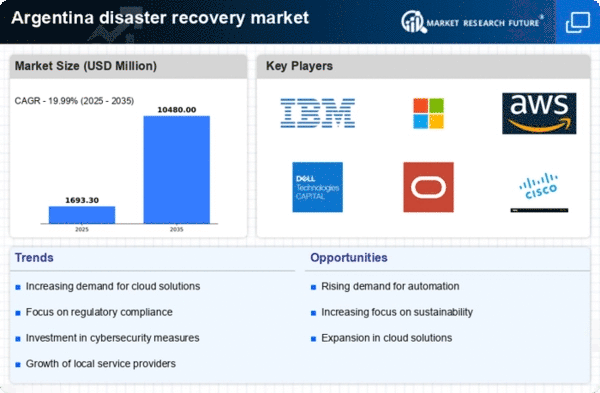Growing Cybersecurity Threats
The growing prevalence of cybersecurity threats is a critical driver for the disaster recovery-service market. In Argentina, businesses are increasingly targeted by cyberattacks, which can lead to significant data loss and operational disruptions. The need for effective disaster recovery solutions to mitigate these risks is becoming more apparent. In 2025, it is estimated that cyber incidents have prompted over 40% of organizations to enhance their disaster recovery strategies. This trend indicates a shift towards prioritizing cybersecurity within recovery plans, thereby expanding the market for disaster recovery services as companies seek to protect their assets and ensure business continuity.
Rising Awareness of Business Continuity
The increasing awareness of business continuity among organizations in Argentina appears to drive the disaster recovery-service market. Companies are recognizing the necessity of having robust disaster recovery plans to ensure operational resilience. This awareness is likely fueled by the growing frequency of natural disasters and cyber threats, which have prompted businesses to prioritize their recovery strategies. In 2025, it is estimated that around 60% of organizations in Argentina have implemented some form of disaster recovery plan, reflecting a significant shift in mindset. The disaster recovery-service market is expected to benefit from this trend, as more businesses seek comprehensive solutions to safeguard their operations and data.
Regulatory Pressures and Compliance Requirements
Regulatory pressures and compliance requirements are becoming increasingly stringent in Argentina, thereby impacting the disaster recovery-service market. Organizations are compelled to adhere to various regulations that mandate the implementation of disaster recovery plans. For instance, financial institutions must comply with regulations that require them to have robust recovery strategies in place. This compliance is not only essential for legal reasons but also for maintaining customer trust. As a result, the disaster recovery-service market is likely to see a surge in demand as companies invest in services that ensure compliance with these regulations, potentially increasing market size by 15% in the coming years.
Technological Advancements in Recovery Solutions
Technological advancements in recovery solutions are significantly influencing the disaster recovery-service market. Innovations such as cloud computing, artificial intelligence, and machine learning are enhancing the efficiency and effectiveness of recovery services. In Argentina, the adoption of cloud-based disaster recovery solutions has surged, with a reported growth rate of 25% in 2025. These technologies enable organizations to recover data more swiftly and minimize downtime, which is crucial for maintaining competitive advantage. As businesses increasingly rely on technology, the demand for sophisticated disaster recovery services is likely to rise, further propelling market growth.
Increased Investment in Infrastructure Resilience
Increased investment in infrastructure resilience is a notable driver of the disaster recovery-service market. The Argentine government and private sector are recognizing the importance of resilient infrastructure in mitigating the impacts of disasters. This investment is likely to enhance the overall recovery capabilities of organizations, as improved infrastructure can facilitate quicker recovery times. In 2025, it is projected that infrastructure investments related to disaster recovery will increase by 20%, reflecting a commitment to enhancing resilience. Consequently, the disaster recovery-service market is expected to benefit from this trend, as organizations seek services that align with their infrastructure improvements.
















